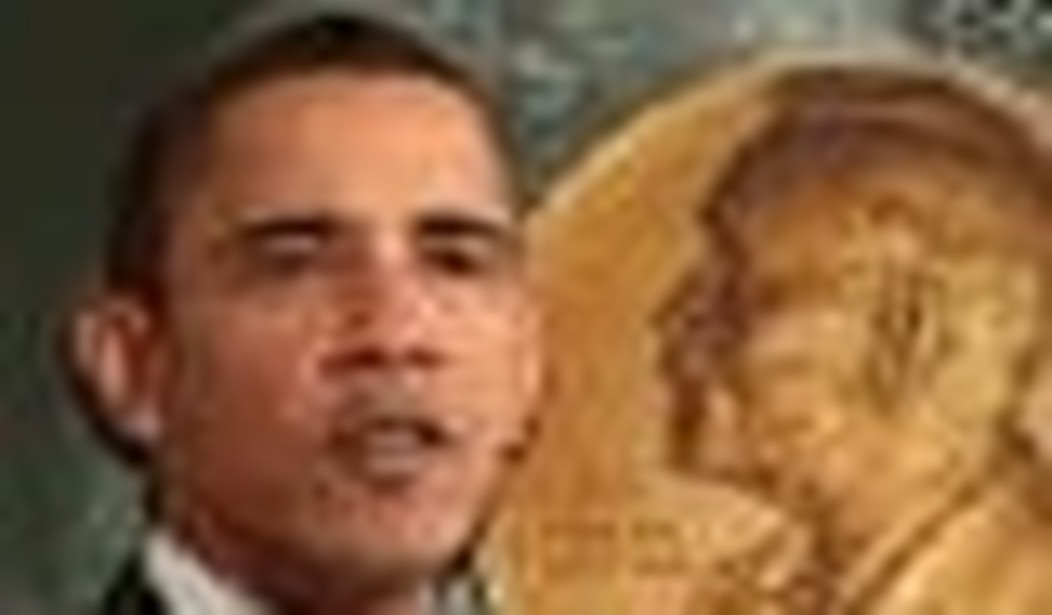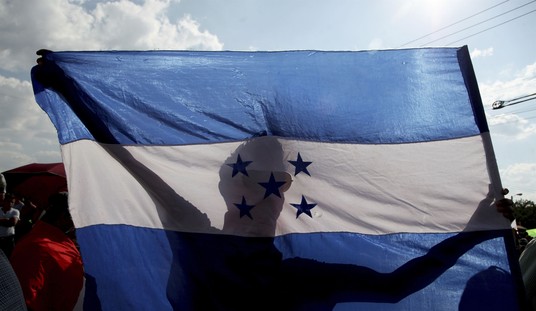OSLO, Norway — A few days from now, the president of the United States will fly to this cold, dark, and usually sleepy northern capital to accept a prize that much of the world still holds in deep respect, even though it should have long since been entirely discredited in the minds of civilized men.
As has been widely observed, of course, the awarding of this trophy to Mr. Obama has already helped to underscore the absurdity of taking this honor any more seriously than, say, the Teen Choice Awards. When the Norwegian Nobel Committee — composed of five people that virtually nobody outside of Norway had ever heard of, and one whom you may have heard of if you’re the kind of person who’s strong on Jeopardy questions about former Scandinavian prime ministers — announced in early October that after months of solemn deliberation it had decided to award the 2009 Nobel Peace Prize to Barack Obama, pretty much the entire U.S. was taken by surprise. In America, after all, we’re used to the idea that an award actually represents some kind of accomplishment. Even Obama lovers wondered: what kind of country would give out an award of such (alleged) importance to a chief executive who had just taken office and had yet to prove himself in any meaningful way?
In an article published on this site at the time, Victor Davis Hanson answered this question very usefully. Thanks to its oil wealth, he explained, “Norway has the leisure to be utopian. … So Norway loves to give award to all sorts of right-thinking frauds (Menchu), scoundrels (Elbaradei), terrorists (Arafat), Stalinists (Le Doc Tho), Elmer Gantrys (Jimmy Carter) and hucksters (Gore) — as it sits in judgment of others from Lala land.” Other, bigger countries are compelled to be realistic about the world; Norway can afford to serve up sanctimonious, more-virtuous-than-thou abstractions — and to award “effort and intention, not achievement.” Hanson suggested that the reader imagine Norway “as the son or daughter of a movie star, one who grew up in Malibu, and feels so terribly about it that he lectures the U.S. about everything from global warming to George Bush’s assorted sins — confident that he will never have to work at Ace Hardware, and never have to live near South Central L.A. That sums up Norway.”
As someone who has lived in Norway for over ten years, I can testify that Hanson is right on the money. As Obama’s big day in Oslo approaches, however, I feel compelled to add a footnote or two — not to contradict Hanson, but rather to support and perhaps amplify his points. One key point, for example, is that it is impossible to underestimate the degree to which Norwegians have it drummed into their heads from infancy on that Norway is “the world’s richest country” as well as “the world’s best country to live in.” There is no doubt in their minds that this is true, because, after all, the UN says so, and in no country on earth (this has, incidentally, been proven by a survey) do the people revere the UN more than they do in Norway.
How refreshing it was, then, to read an op-ed that appeared in late October in Aftenposten, the closest thing Norway has to a newspaper of record. In the op-ed, a journalist named Henryk E. Malinowski, who lives in Norway, systematically compared the school his kid attends here to a typical school back in his Polish homeland. Malinowski’s verdict (and I put it somewhat more bluntly than he does): Polish kids and teachers are well-disciplined, well-mannered, and hard-working, while their Norwegian counterparts are — not to put too fine a point on it — spoiled, lazy brats. In Polish schools there are more facilities, such as libraries and swimming pools, than in Norway; Polish schools offer an array of free after-school programs directed at kids with a wide range of academic, creative, and athletic interests; in Norway, the only such free program is soccer practice — and as a result kids “only talk about one thing: soccer. And those who aren’t good at soccer or are interested in other things ‘aren’t part of the group.’” The Polish system, moreover, identifies kids with special gifts early on and gives them special attention; not so in Norway, where excellence, though rather more tolerated now than it was in the post-1968 heyday (when — and I’m not kidding here — gifted kids were effectively punished for “showing off” and sticking out), is still not actively encouraged.
As Hanne Nabintu Herland noted in an op-ed the other day which followed up on Malinowki’s, Norwegian Foreign Minister Jonas Gahr Støre — in reply to concerns that the Norwegian educational system doesn’t do enough to cultivate the country’s best minds — said that there’s no need to do this, because — hey! — the best minds will cultivate themselves. While Malinkowski contrasts Norway unfavorably with Poland (a comparison that must, by the way, have shocked plenty of Norwegians, who tend to look down on Poles because in recent years tens of thousands of them have come to Norway to do hard labor that Norwegians aren’t interested in doing), Herland looks to Finland, noting that while the UN may say that Norway is the best country to live in (largely because oil income makes its GNP per inhabitant sky-high), the Financial Times recently accorded that honor to Finland. Herland hails Finnish schools and suggests that one reason why they’re widely considered Europe’s best is that “Finland couldn’t afford reforms” of the kind that cultural radicals engineered in Norwegian classrooms over the last half-century or so. Finnish schools, Herland points out, “don’t emphasize fun and games, but hard work, just as in the 1950s. … In Norway, the Finnish system would probably be called old-fashioned.” Herland makes exactly the same point Hanson does — that thanks to Norwegian oil wealth, “we have been able to afford to relax.” It’s no exaggeration, I think, to say that many Norwegians not only accept indolence, idleness, and mediocrity, but feel, at a very deep level, more at ease with the comforting conformity of averageness than with — say — the restless inventiveness of an Edison, the incomprehensible genius of an Einstein, or the imaginative brilliance of a Mozart.
But there’s another important piece to this puzzle. Norwegians aren’t just brought up to see their country as the world’s richest and best to live in; they also see it as the “peace nation.” You could put together a sizable anthology of inane texts on this subject by leading politicians, journalists, professors, authors, and other members of Norway’s lockstep cultural elite. One of them, the above-mentioned Gahr Støre, summed up the usual line of argument in a speech he gave at the Oslo Peace Center a couple of years ago. There are, he bragged, good reasons why Norway, of all places, became a “peace nation” — namely “the tradition of solidarity in the labor movement” and the fact that “social democracy is based on the idea of common responsibility for the common future.” The underlying point being that what matters in Norway is communal, not personal, responsibility, and the well-being of the group rather than the achievement of the individual. For the kinds of people who run Norway, the main thing about individual excellence is that it’s something to be punished through taxation in order to subsidize the inferior and thereby even things out. There’s more than a casual connection, accordingly, between Norway’s “peace nation” rap and its exaltation of mediocrity.
The soft, cuddly “peace nation” image of Norway came into a special kind of focus lately when it emerged that Oslo resident Mullah Krekar — the fanatical, child-torturing founder of the Islamic terrorist group Ansar al-Islam — had given an interview to the Arabic-language al-Hiwar TV channel in which he praised Osama bin Laden and looked forward to a Muslim caliphate in Europe. The Krekar case has for years been the perfect demonstration of the Norwegian governing mentality. Krekar has repeatedly made it clear that he is a bloodthirsty jihadist who despises Western freedoms and cheers the murder of infidels; and repeatedly the Norwegian media have served up cozy profiles of him, depicting him as a charming, gregarious family man whose life in Oslo (where I’ve seen him on the streets myself) is made difficult by the waves of media attention that follow his occasional pro-jihad statements and by the intermittent efforts of a few troublemaking government officials to have him deported to either the U.S. or his homeland of Iraq. Of course, Norwegian courts have ruled that he can’t be deported to either country, because he might face the death penalty in those places, and the “peace nation” doesn’t want to have even a terrorist’s blood on its soft, pretty hands. Indeed, it is in the nature of the “peace nation” to care more about the life of a terrorist than about his victims, past or potential. The formula seems to be this: the more abominable the monster, the more virtuous Norway is for embracing him.
So it is that the routine response of the Norwegian cultural elite to this unapologetic warrior against the West is to portray him as a harmless victim. After Krekar’s remarks to al-Hiwar surfaced, for example, Norway’s biggest newspaper, VG, rushed a photographer over to his house to take yet another in a long line of pictures of Krekar and/or his wife whose express purpose is to win sympathy for them. In the accompanying article, Lars Akerhaug writes that “Mullah Krekar is talking about the tough times his family has gone through when the storms have been breaking most violently around him. But he still has a positive impression of Norwegians.” Akerhaug goes on to quote Krekar on Norway: it is “Europe’s butterfly,” a place of “peace, beauty, civilization, and culture. … Norwegians are a peaceful, cultivated, and open people.” When asking yourself what kind of people could give a Nobel Peace Prize to Barack Obama, all you need to know is that they are the kind of people who glow with pride when they hear a terrorist describe their country as a butterfly.
Anyway, it seems clear that all of this — the indifference (and even hostility) to individual achievement in the schoolroom and beyond, the preference for empty peace-and-love rhetoric over tough, intelligent realpolitik, the prioritization of social-democratic communalism over personal responsibility, the readiness to bow and scrape to bullying tyrants in the name of “peace,” and the pathetic eagerness to be seen by those bullying tyrants as a pretty little “butterfly” on the world stage — all this makes far more comprehensible the Norwegian Nobel Committee’s decision to hand one of their medals to a man who has snubbed America’s democratic friends and eulogized its autocratic foes, who is all too eager to foist socialist solutions on a republic founded on individual liberty, and whose résumé, while light on real-world accomplishments, is heavy on high-minded yap about peace and dialogue. I suppose one can only be glad that the lepidoptera in Oslo don’t also pass out the prizes for chemistry, physics, and medicine.









Join the conversation as a VIP Member